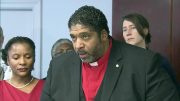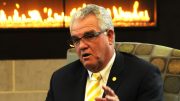A former University of San Diego student is suing the school, saying she was drugged, strangled and raped in her dorm room and the school mishandled the investigation and then failed to help her feel safe on campus.
The student reported that she was attacked in February 2014. She requested to be identified only by her nickname, “Niki,” and The San Diego Union-Tribune agreed, given a policy of not naming sexual assault victims unless they choose to be identified.
âI thought the people at the school would be willing to help me,” said Niki, who was a student athlete. “I thought that they’d be there for me and do what they could to make me feel somewhat safe, and they treated me like I was the one who had done something wrong.”
USD spokeswoman Pamela Gray Payton said that the private Catholic university does not comment on open investigations or pending litigation. She said the university disputes the description of events from Niki’s attorney.
âOne of our most cherished values at USD is our commitment to the dignity of each human being,” Payton said. “Sexual violence in any form is antithetical to our mission, and we take very seriously our obligations under Title IX.”
Such cases have been in the news since 2011, when the federal Department of Education issued a “Dear Colleagues” letter with clarifications and guidelines about universities’ responsibilities for handling sexual misconduct incidents under Title IX, a federal law banning sex discrimination in education.
The department has followed up by opening 31 investigations in California. USD is the only San Diego-based campus subject to such a review.
The year Niki reported the attack, USD reported six rapes on campus. For comparison, the much larger San Diego State University reported 12 rapes on campus rapes in 2014.
‘Very dizzy, very weak’
Niki was hanging out with her new roommates and their friends in her dorm on Feb. 8, 2014. She had just moved into the dorm in January. One of the friends offered to make her a mimosa, Niki recalled.
“When he gave it to me, after drinking a little bit of it, I started to feel very dizzy, very weak,” she said in a telephone interview. “It was getting hard to move.”
Niki said that her roommates went to bed shortly after, and that’s when the man strangled and raped her.
She said that as soon as she was able to move again, she fled her dorm room and called a friend for help. In a nearby campus parking garage, she met with an officer from the university’s department of public safety. According to a report from one of the responding officers, it was about 1:55 a.m.
Niki said she told the officer she was drugged and raped and that she wanted him to call the police. He arranged for an ambulance to take Niki to the hospital. The officer who wrote the report went to Niki’s dorm.
From there, according to Niki’s lawyer Carla DiMare, the university botched the investigation.
At Niki’s dorm, the officer let himself in after no one answered his knock, according to his report. He reported finding a naked man asleep in Niki’s bed. He asked the man what Niki had had to drink that night, and the man answered Four Loko, a malt beverage.
He asked the man to get up so they could talk and then left him alone in the bedroom with the door closed while he spoke to Niki’s roommate, the report says. The officer noticed sofa cushions and men’s and women’s clothing on the floor.
Niki’s roommate took some of the clothing to the man in Niki’s room so he could get dressed, according to the report. The report also says the officer noticed a nearly full can of Four Loko and asked the man if that was Niki’s drink. The man said no, she had actually had wine and fireball whiskey, according to the report.
The man grabbed underwear from the floor, went back into the bedroom and came out approximately one minute later, according to the report.
Two more public safety officers arrived at the dorm. One asked the man if he had sex with Niki. He said, “Yes,” the report says.
That officer then gave the man a ride home.
There is no mention in the report of the officers asking follow up questions or collecting evidence, such as to test the drinks for drugs, or of trying to keep the man from contaminating the crime scene.
Asked about the apparent omission, Payton said, “the Department of Public Safety responded immediately and in a manner consistent with its protocols.”
According to court filings by USD, the public safety officers were only aware that Niki might have been drugged when she left in the ambulance. Only later did the hospital inform the university that she said she’d been sexually assaulted, the filings say.
A San Diego police officer came to the hospital to see Niki around 5:19 a.m., according to a police report. It is not clear from the report what time the call was made to police, or by whom.
Niki’s mother said that, in the end, the call was made by the hospital, which has mandatory reporting requirements. Court filings from the university assert that SDPD “was notified” but do not say by whom.
‘It is unfortunate’
The university recommends on its website that students report violent crimes including rape to its department of public safety. The website says that public safety staff will notify San Diego police on the student’s behalf.
The university has an agreement with the San Diego Police Department that says the police will be the “primary reporting and investigating agency for ALL violent crimes occurring on USD property.”
DiMare said that the delayed call to police and the lack of evidence gathered by the university public safety officers hamstrung the investigation.
The District Attorney’s Office decided not to proceed with charges, according to an email written from the police detective to a university public safety officer.
“They definitely believe her that the assault occurred; however, they feel they don’t have enough to prove the allegation beyond a reasonable doubt… As you know, [he] admitted to the sex acts, but denies it was forced. It is unfortunate there was not some justice for the victim,” the May 1, 2014 email from Detective Tracey Barr says.
The email uses the name of the man, but the Union-Tribune is withholding it because he was not charged with a crime. The police department did not respond to a request for comment for this story.
According to David Lisak, a forensic consultant who teaches classes to the military about sexual assault investigations, investigating sexual assault between people who are not strangers requires a high level of specialization and is very time sensitive.
“If a student is willing to go forward with a criminal investigation, one of the things you want is for that criminal investigation to be launched immediately. Minutes matter, not hours,” Lisak said, adding that investigators need to gather all possible evidence, not knowing what might be useful.
He said that the most important evidence is often digital. Text messages or other communication sent to each other or friends over the course of the night can help determine whether there was consent.
“There are very many things that have to be done to avoid what happens frequently at universities — they sit down with two parties and ask some questions and think they’re going to be able to divine the truth,” Lisak said. “That is pretty much never the case.”
Lisak said that he doubted most university public safety departments receive the kind of specialized training necessary to handle non-stranger rape.
When asked about the type of training that public safety officers receive, Payton said via email, “USD’s Department of Public Safety officers are not sworn police officers. As a result, the training they receive is not the same as a sworn police force, but they do receive various types of training appropriate to their positions.”
The U-T attempted to contact the man by phone, Facebook and at his last known address. He did not respond.
In a handwritten court filing, he said that “all sexual activity was consensual and initiated by [Niki].”
‘Happy about that’
Niki’s family flew down to take care of her, and she stayed with them in a hotel, according to Niki’s mother. She said Niki was still very sick when they picked her up late Sunday.
She went with her daughter to meet with Dayanne Izmirian, assistant dean for residential life, to help identify a new dorm. Niki’s mother recalled Izmirian taking them to see a room and then sliding a letter across a table to Niki.
The “no contact” letter was part of the university’s preparation for an administrative investigation and hearing with possible disciplinary outcomes for the man. It told Niki that she could not contact him. It also said that she could not talk to her roommates or the friend who picked her up about what happened, according to a copy obtained by the Union-Tribune.
Niki’s mom said Izmirian asked if Niki had spoken with the police about pursuing an investigation. Niki said she hadn’t returned their calls yet.
“She said she was happy about that,” Niki’s mother recalled, referring to Izmirian.
Izmirian told Niki that the letter was so that the university could protect her, Niki’s mother said, adding that after Niki signed it, Izmirian told her that it also meant she could not contact police.
“You need to let campus do their investigation before the police department gets involved,” Niki’s mother recalled Izmirian saying.
When asked about the incident involving Izmirian, Payton responded on behalf of USD, “The accusations made by [Niki] against Ms. Izmirian are untrue. We do not believe it is appropriate to litigate this case in the media. We are confident that when the evidence comes out, it will demonstrate that USD responded promptly and appropriately to the incident.”
Niki said that after the Izmirian meeting she started to worry that the university wasn’t handling the situation properly. She decided to return the police calls.
“That was the most humiliating feeling,” she said. “They cared more about their own image than they did about the safety of their students.”
According to the “Dear Colleagues” letter from 2011, “a school should notify a complainant of the right to file a criminal complaint, and should not dissuade a victim from doing so either during or after the school’s internal Title IX investigation.”
Differences in communication
After Niki reported being raped, USD’s written communication with her differed from its communication with the man she accused.
Both students received “no contact letters” which said that they could not contact each other.
His letter said he could not contact:
- Niki
Niki’s letter said she could not contact:
- The man she accused
- Her roommates
- Her best friend
The letters each student received about the university hearing were different as well.
His letter was dated eight days before the hearing.
Niki’s letter was dated seven days before the hearing.
Niki was living in North Carolina at the time.
His letter said that he was “strongly encouraged” to schedule a meeting with the Assistant Dean of Students prior to the hearing.
Niki’s letter said that she was “encouraged” to schedule a meeting with the Assistant Dean of Students prior to the hearing.
His letter said the meeting would be “to review the case information, discuss the process for bringing in a witness, and address any questions you have about the hearing process.”
Niki’s letter said the meeting would be “to review the documents and the hearing process.”
According to the Title IX “Dear Colleagues” letter, “throughout a school’s Title IX investigation, including at any hearing, the parties must have an equal opportunity to present relevant witnesses and other evidence.”
Leaving school
Between the attack and the school hearing, Niki first tried to keep up with her classes. She said her the man followed her twice on campus.
She reported it to the university and requested a flexible parking pass to allow her to park close to her building for her night class. Niki’s mother said she even offered to pay for the pass. The university parking services supervisor denied her request via email.
âShe would still be able to park in the West Lot and take the Tram up to class. The trams run until 11pm,” the supervisor said in the email.
âFor something so insignificant to USD â they wouldn’t even notice that there was a car parking someplace else â it doesn’t make sense that they would be like that,” Niki’s mother said.
Niki said she submitted leave of absence paperwork soon after.
In court filings, the university said, “USD’s Title IX Coordinator and other University officials immediately began working with [Niki] to coordinate academic, safety, parking and residential accommodations for her. At [Niki’s] request, and with [Niki’s] input, USD promptly arranged for her to move to a new dorm room on campus.”
Niki moved to North Carolina and enrolled in a university program there, set to begin that summer. She flew to North Carolina on May 9, a few weeks before receiving a hearing notification letter.
The school emailed the letter after 7 p.m. on May 23. By the time Niki read the email, she had less than a week to figure out how to get back for the May 30 hearing. She said she asked university officials if they could postpone it to give her time to get to San Diego or if she could participate by phone, but was told no.
To get there, Niki would have had to spend $2,000 on a plane ticket, her mother said. She decided not to go.
âI think my husband and I and Niki didn’t think that they would just sort of forget about it and say that nothing happened,” Niki’s mother said.
University hearings for sexual misconduct have a lower burden of proof than criminal courts. An attacker can be found guilty through “a preponderance of evidence,” which the department of education defines as, “It is more likely than not that sexual harassment or violence occurred.”
The hearing found in favor of the man Niki accused.
The university’s court filings maintain that Niki was “timely informed of her right to participate in the hearing, but [Niki] chose not to do so.”
The US Department of Education Office for Civil Rights has opened two investigations into USD for possible Title IX violations resulting from its handling of rape cases, the only campus in San Diego so scrutinized.
The department does not identify which cases it’s reviewing, but timing of the two investigations suggests both may be related to one off-campus rape that spurred another lawsuit by the same firm that is representing Niki. The university was dropped as a defendant in that lawsuit. The alleged perpetrators settled the remaining claims.
According to a statement from the civil rights office, “It should be noted that the opening of an investigation by OCR in itself does not indicate that the institution is violating or has violated any federal law or that OCR has reached a conclusion as to whether a violation of any federal law exists.”
Source: www.sandiegouniontribune.com




